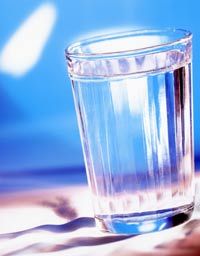The Function of Water
Water
We rarely think about how important water is to life on Earth. Water covers 70 percent of the surface, and about 3 percent of it is drinkable (or potable) water. Our bodies are made up of about 60 to 70 percent water, and if you focus even further on specific organs, our need for continual hydration makes sense. The brain is about 80 percent water, blood is about 90 percent and the liver is nearly 97 percent.
Advertisement
Water acts as a messenger within our systems, carrying nutrients to cells and flushing waste and toxins out of our bodies. It also regulates our body temperature -- when it's too hot outside or we exercise, we sweat. As sweat evaporates, our bodies cool down to a manageable temperature.
In the same way a car needs oil to run smoothly, our bodies need water. Just like oil, however, water needs to be replaced. Our bodies lose about 250 milliliters of water every day, and doctors recommend drinking at least eight glasses every day. If we don't, we become dehydrated, leading to headaches, fatigue and lack of concentration. And, although we can survive for weeks without food, it only takes a few days before a lack of water becomes fatal.
Vitamins
When we eat food, a wide variety of substances, including protein, carbohydrates and fats, enters the body and provides us with energy and maintains tissue. These substances carry out their functions by chemical reactions. They wouldn't be able to do so, however, without the help of vitamins.

Found in many foods and beverages, vitamins act as catalysts by accelerating these reactions. When we experience a vitamin deficiency, our bodies can't perform these functions easily, causing us to become sick. Think of it this way -- if water is oil for the body, then vitamins are much like the spark that ignites gasoline in our cars.
Vitamins are split up into two groups and defined by the materials in which they dissolve. Fat-soluble vitamins dissolve in fat, and excesses are stored in fatty tissues -- since they are distributed slowly throughout our bodies, we don't need to replace them daily. Fat-soluble vitamins include vitamin A, vitamin D, vitamin E and vitamin K. Water-soluble vitamins, on the other hand, dissolve in water and are excreted out of the body in urine -- that's why it's important to replace them on a daily basis. Water-soluble vitamins include the vitamin B-complex group and vitamin C.
Aside from foods such as fruits and vegetables, vitamins are also available in supplemental form -- in pills or liquids.
